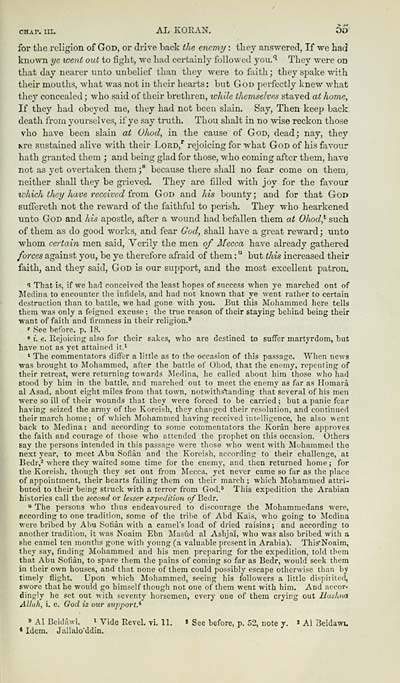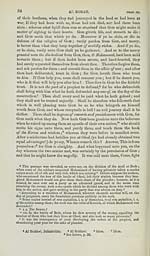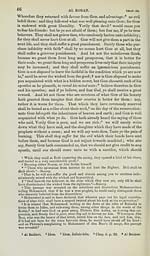Download files
Complete book:
Individual page:
Thumbnail gallery: Grid view | List view

for tlie religion of God, or drive back the enemy : they answered, If -vve had
known ye went out to fight, we had certainly followed you.*^ They were on
that day nearer unto unbelief than they were to faith ; they spake with
their mouths, what was not in their hearts: but God perfectly knew what
they concealed ; who said of their brethren, while themselves staved at home,
If they had obeyed me, they had not been slain. Say, Then keep back
death from yourselves, if ye say truth. Thou shalt in no wise reckon those
vho have been slain at Oltod, in the cause of God, dead; nay, they
Nre siistained alive with their Lord,"" rejoicing for what God of his favour
hath granted them ; and being glad for those, who coming after them, have
not as yet overtaken them f because there shall no fear come on them^
neither shall they be gi-ieve.d. They are filled with joy for the favour
wldch they have received ivom. God and Ids boimty; and for that God
sufFereth not the reward of the faithful to perish. They who hearkened
unto God and Ids apostle, after a wound had befallen them at Ohod,^ such
of them as do good works, and fear God, shall have a gi-eat reward ; unto
whom certain men said, Yerily the men of Mecca have already gathered
forces against you, be ye therefore afraid of them : " but this increased their
faith, and they said, God is our support, and the most excellent patron.
1 That is, if we had conceived the least hopes of success when ye marched ont of
Jledina to encounter the infidels, and had not known that ye went rather to certain
destruction than to battle, we had gone with you. But this Mohammed here tells
them was only a feigned excuse ; the true reason of their staying behind being their
want of faith and firmness in their religion.*
' See hefore, p. 18.
8 t. e. Rejoicing also for their sakes, who are destined to suffer martyrdom, but
have not as yet attained it."^
' The commentators diifer a little as to the occasion of this passage. When news
was brought to Mohammed, after the battle of Ohod, that the enemy, repenting of
their retreat, were returning towards Medina, he called about him those who had
stood by him in the battle, and marched out to meet the enemy as far as Homara
al Asad, about eight miles from that town, notwithstanding that several of his men
were so ill of their wounds that they were forced to be carried ; but a panic fear
having seized the army of the Koreish, they changed their resolution, and continued
their march home; of which Mohammed having received intelligence, he also went
back to Medina: and according to some commentators the Koran here approves
the faith and courage of those who attended the prophet on this occasion. Others
say the persons intended in this passage were those who went with Mohammed the
next year, to meet Abu Sofian and the Koreish, according to their challenge, at
Bcdr,2 where they waited some time for the enemy, and then returned home ; for
the Koreish, though they set ont from Mecca, yet never came so far as the place
of appointment, their hearts failing them on their march; which Mohammed attri-
buted to their being struck with a terror from God.* This expedition the Arabian
histories call the second or lesser expedition o/Bedr.
" The persons who thus endeavoured to discourage the Mohammedans were,
according to one tradition, some of the tribe of Abd Kais, who going to Medina
vrere bribed by Abu Sofian with a camel's load of dried raisins; and according to
another tradition, it was Noaim Ebn Masiid al Ashjai, who was also bribed with a
she camel ten months gone witli young (a valuable present in Arabia). This'Noaim,
they say, finding Mohammed and his men preparing for the expedition, told tbem
that Abu Sofian, to spare them the pains of coming so far as Bedr, would seek them
in their own houses, and that none of them could possibly escape otherwise than by
timely flight. Upon which Mohammed, seeing his followers a little dispiiitecl,
swore that he would go himself though not one of them went with him. And accor-
dingly he set out with seventy horsemen, every one of them crying out Hushiui
Allah, i. e. God is our support.^
9 Al Bcidrnvi. t Vide Revel, vi. 11. > See before, p. 52, note y. » Ai Beidawu
* Idem. Jallalo'ddin.
known ye went out to fight, we had certainly followed you.*^ They were on
that day nearer unto unbelief than they were to faith ; they spake with
their mouths, what was not in their hearts: but God perfectly knew what
they concealed ; who said of their brethren, while themselves staved at home,
If they had obeyed me, they had not been slain. Say, Then keep back
death from yourselves, if ye say truth. Thou shalt in no wise reckon those
vho have been slain at Oltod, in the cause of God, dead; nay, they
Nre siistained alive with their Lord,"" rejoicing for what God of his favour
hath granted them ; and being glad for those, who coming after them, have
not as yet overtaken them f because there shall no fear come on them^
neither shall they be gi-ieve.d. They are filled with joy for the favour
wldch they have received ivom. God and Ids boimty; and for that God
sufFereth not the reward of the faithful to perish. They who hearkened
unto God and Ids apostle, after a wound had befallen them at Ohod,^ such
of them as do good works, and fear God, shall have a gi-eat reward ; unto
whom certain men said, Yerily the men of Mecca have already gathered
forces against you, be ye therefore afraid of them : " but this increased their
faith, and they said, God is our support, and the most excellent patron.
1 That is, if we had conceived the least hopes of success when ye marched ont of
Jledina to encounter the infidels, and had not known that ye went rather to certain
destruction than to battle, we had gone with you. But this Mohammed here tells
them was only a feigned excuse ; the true reason of their staying behind being their
want of faith and firmness in their religion.*
' See hefore, p. 18.
8 t. e. Rejoicing also for their sakes, who are destined to suffer martyrdom, but
have not as yet attained it."^
' The commentators diifer a little as to the occasion of this passage. When news
was brought to Mohammed, after the battle of Ohod, that the enemy, repenting of
their retreat, were returning towards Medina, he called about him those who had
stood by him in the battle, and marched out to meet the enemy as far as Homara
al Asad, about eight miles from that town, notwithstanding that several of his men
were so ill of their wounds that they were forced to be carried ; but a panic fear
having seized the army of the Koreish, they changed their resolution, and continued
their march home; of which Mohammed having received intelligence, he also went
back to Medina: and according to some commentators the Koran here approves
the faith and courage of those who attended the prophet on this occasion. Others
say the persons intended in this passage were those who went with Mohammed the
next year, to meet Abu Sofian and the Koreish, according to their challenge, at
Bcdr,2 where they waited some time for the enemy, and then returned home ; for
the Koreish, though they set ont from Mecca, yet never came so far as the place
of appointment, their hearts failing them on their march; which Mohammed attri-
buted to their being struck with a terror from God.* This expedition the Arabian
histories call the second or lesser expedition o/Bedr.
" The persons who thus endeavoured to discourage the Mohammedans were,
according to one tradition, some of the tribe of Abd Kais, who going to Medina
vrere bribed by Abu Sofian with a camel's load of dried raisins; and according to
another tradition, it was Noaim Ebn Masiid al Ashjai, who was also bribed with a
she camel ten months gone witli young (a valuable present in Arabia). This'Noaim,
they say, finding Mohammed and his men preparing for the expedition, told tbem
that Abu Sofian, to spare them the pains of coming so far as Bedr, would seek them
in their own houses, and that none of them could possibly escape otherwise than by
timely flight. Upon which Mohammed, seeing his followers a little dispiiitecl,
swore that he would go himself though not one of them went with him. And accor-
dingly he set out with seventy horsemen, every one of them crying out Hushiui
Allah, i. e. God is our support.^
9 Al Bcidrnvi. t Vide Revel, vi. 11. > See before, p. 52, note y. » Ai Beidawu
* Idem. Jallalo'ddin.
Set display mode to: Large image | Transcription
Images and transcriptions on this page, including medium image downloads, may be used under the Creative Commons Attribution 4.0 International Licence unless otherwise stated. ![]()
| Early Gaelic Book Collections > J. F. Campbell Collection > Koran: or, Alcoran of Mohammed > (209) |
|---|
| Permanent URL | https://digital.nls.uk/77136394 |
|---|
| Description | Volumes from a collection of 610 books rich in Highland folklore, Ossianic literature and other Celtic subjects. Many of the books annotated by John Francis Campbell of Islay, who assembled the collection. |
|---|
| Description | Selected items from five 'Special and Named Printed Collections'. Includes books in Gaelic and other Celtic languages, works about the Gaels, their languages, literature, culture and history. |
|---|

